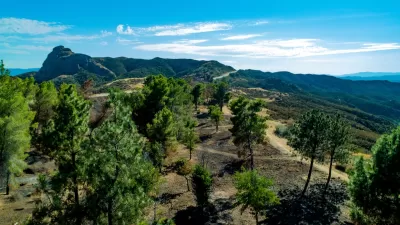Effective wildfire mitigation in California requires a holistic approach that goes beyond large-scale vegetation removal, emphasizing home hardening, defensible space, strategic planning, and reducing human-caused ignitions.

The January 2025 Los Angeles wildfires devastated the region, destroying over 10,000 homes and resulting in more than two dozen fatalities. In response, some have proposed solutions like the "Fix Our Forests Act," which may inadvertently harm California's unique ecosystems without effectively addressing the root causes of such fires. A prevalent misconception is that large-scale vegetation clearing can mitigate wildfire risks; however, experts argue that this approach oversimplifies the complex nature of wildfires in California's diverse ecosystems. Effective solutions require multifaceted, region-specific strategies that consider ecological nuances and emphasize improved urban planning.
California's ecosystems, including mixed conifer forests, oak woodlands, and shrublands, each have distinct fire regimes characterized by variations in frequency, timing, size, and intensity. In Southern California, native shrublands like chaparral and sage scrub are adapted to infrequent, high-intensity fires occurring every 30 to 100 years. Historically, these areas experienced low lightning strike frequencies, resulting in fewer natural ignitions. The plant species in these ecosystems possess adaptations such as fire-induced seed germination and resprouting, enabling rapid recovery after intense fires. However, excessive disturbances, including frequent fires, can negatively impact these ecosystems, underscoring the importance of tailored fire management strategies.
While fuel modification can be beneficial in specific contexts, such as creating defensible space around structures and establishing strategic fuel breaks to aid firefighting efforts, it is not a panacea. During extreme wind events, like those driven by Santa Ana winds, embers can travel significant distances, igniting structures regardless of nearby vegetation management. Therefore, experts advocate for a comprehensive approach to wildfire risk mitigation that includes home hardening, maintaining defensible space, thoughtful community and infrastructure planning, and reducing human-caused ignitions. This holistic strategy aims to enhance community resilience while preserving the ecological integrity of California's diverse landscapes.
FULL STORY: Expert Perspective: Wildland Fuels Management Would Not Have Saved Us from the January 2025 LA Fires

Planetizen Federal Action Tracker
A weekly monitor of how Trump’s orders and actions are impacting planners and planning in America.

Chicago’s Ghost Rails
Just beneath the surface of the modern city lie the remnants of its expansive early 20th-century streetcar system.

San Antonio and Austin are Fusing Into one Massive Megaregion
The region spanning the two central Texas cities is growing fast, posing challenges for local infrastructure and water supplies.

Since Zion's Shuttles Went Electric “The Smog is Gone”
Visitors to Zion National Park can enjoy the canyon via the nation’s first fully electric park shuttle system.

Trump Distributing DOT Safety Funds at 1/10 Rate of Biden
Funds for Safe Streets and other transportation safety and equity programs are being held up by administrative reviews and conflicts with the Trump administration’s priorities.

German Cities Subsidize Taxis for Women Amid Wave of Violence
Free or low-cost taxi rides can help women navigate cities more safely, but critics say the programs don't address the root causes of violence against women.
Urban Design for Planners 1: Software Tools
This six-course series explores essential urban design concepts using open source software and equips planners with the tools they need to participate fully in the urban design process.
Planning for Universal Design
Learn the tools for implementing Universal Design in planning regulations.
planning NEXT
Appalachian Highlands Housing Partners
Mpact (founded as Rail~Volution)
City of Camden Redevelopment Agency
City of Astoria
City of Portland
City of Laramie





























